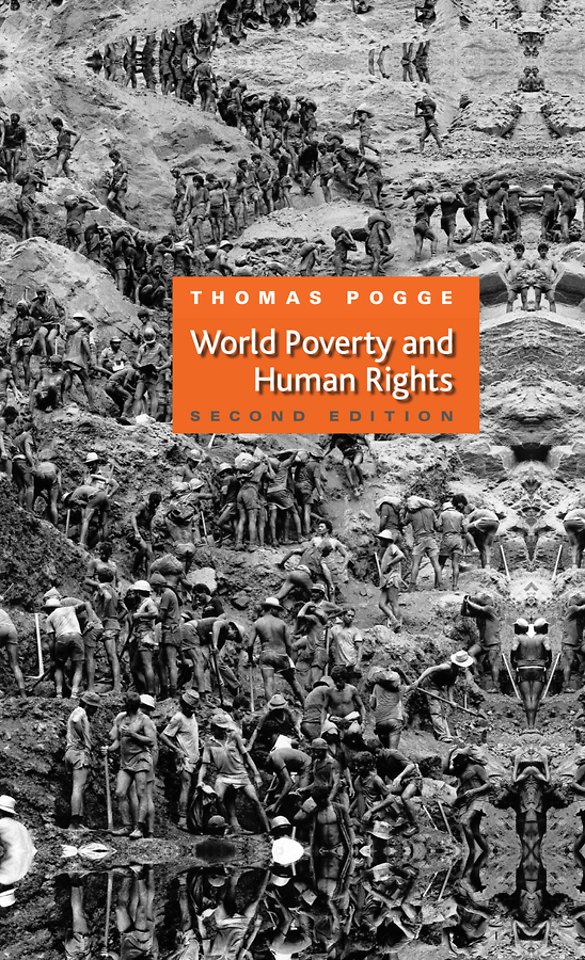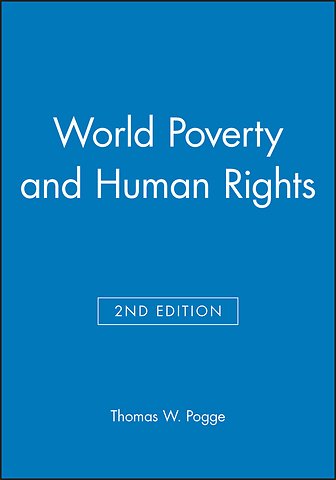Thomas Pogge
Polity
1e druk, 2008
9780745641430
World Poverty and Human Rights
Specificaties
Gebonden, 304 blz.
|
Engels
Polity |
1e druk, 2008
ISBN13: 9780745641430
Rubricering
Levertijd ongeveer 8 werkdagen
Gratis verzonden
Specificaties
ISBN13:9780745641430
Taal:Engels
Bindwijze:gebonden
Aantal pagina's:304
Uitgever:Polity
Druk:1
Verschijningsdatum:1-1-2008
Hoofdrubriek:Management
Inhoudsopgave
Introduction.I Some Cautions About Our Moral Judgements.II Four Easy Reasons to Ignore World Poverty.III Sophisticated Defenses of our acquiescence in world poverty.IV Does Our New Global Economic Order Really Not Harm the Poor?.V Responsibilities and Reforms.Chapter 1: Human Flourishing and Universal Justice.1. 0 Introduction.1. 1 Social Justice.1. 2 Paternalism.1. 3 Justice in First Approximation.1. 4 Essential Refinements.1. 5 Human Rights.1. 6 Specification of Human Rights and Responsibilities for their Realization.1. 7 Conclusion.Chapter 2: How Should Human Rights be Conceived?.2. 0 Introduction.2. 1 From Natural Law to Rights.2. 2 From Natural Rights to Human Rights.2. 3 Official Disrespect.2. 4 The Libertarian Critique of Social and Economic Rights.2. 5 The Critique of Social and Economic Rights as Manifesto Rights .2. 6 Disputes about Kinds of Human Rights.Chapter 3: Loopholes in Moralities.3. 0 Introduction.3. 1 Types of Incentives.3. 2 Loopholes.3. 3 Social Arrangements.3. 4 Case 1: The Converted Apartment Building.3. 5 Case 2: The Homelands Policy of White South Africa.3. 6 An Objection.3. 7 Strengthening.3. 8 Fictional Histories.3. 9 Puzzles of Equivalence.3. 10 Conclusion.Chapter 4: Moral Universalism and Global Economic Justice.4. 0 Introduction.4. 1 Moral Universalism.4. 2 Our Moral Assessment of National and Global Economic Orders.4. 3 Some Factual Background about the Global Economic Order.4. 3. 1 The Extent of World Poverty.4. 3. 2 The Extent of Global Inequality.4. 3. 3 Trends in World Poverty and Inequality.4. 4 Conceptions of National and Global Economic Justice Contrasted.4. 5 Moral Universalism and David Miller s Contextualism.4. 6 Contextualist Moral Universalism and John Rawls s Moral Conception.4. 7 Rationalizing Divergent Moral Conceptions Through a Double Standard.4. 8 Rationalizing Divergent Moral Conceptions Without a Double Standard.4. 9 The Causal Role of Global Institutions in the Persistence of Severe Poverty.4. 10 Conclusion.Chapter 5: The Bounds of Nationalism.5. 0 Introduction.5. 1 Common Nationalism Priority for the Interests of Compatriots.5. 2 Lofty Nationalism The Justice for Compatriots Priority.5. 3 Explanatory Nationalism The Deep Significance of National Borders.5. 4 Conclusion.Chapter 6: Achieving Democracy.6. 0 Introduction.6. 1 The Structure of the Problem Faced by Fledgling Democracies.6. 2 Reducing the Expected Rewards of Coups d Etat.6. 3 Undermining the Borrowing Privilege of Authoritarian Predators.6. 3. 1 The Criterial Problem.6. 3. 2 The Tit For Tat Problem.6. 3. 3 The Establishment Problem.6. 3. 4 Synthesis.6. 4 Undermining the Resource Privilege of Authoritarian Predators.6. 5 Conclusion.Chapter 7: Cosmopolitanism and Sovereignty.7. 0 Introduction.7. 1 Institutional Cosmopolitanism Based on Human Rights.7. 2 The Idea of State Sovereignty.7. 3 Some Main Reasons for a Vertical Dispersal of Sovereignty.7. 3. 1 Peace and Security.7. 3. 2 Reducing Oppression.7. 3. 3 Global Economic Justice.7. 3. 4 Ecology/Democracy.7. 4 The Shaping and Reshaping of Political Units.7. 5 Conclusion.Chapter 8: Eradicating Systemic Poverty: Brief for a Global Resources Dividend.8. 0 Introduction.8. 1 Radical Inequality and Our Responsibility.8. 2 Three Grounds of Injustice.8. 2. 1 The Effects of Shared Social Institutions.8. 2. 2 Uncompensated Exclusion from the Use of Natural Resources.8. 2. 3 The Effects of a Common and Violent History.8. 3 A Moderate Proposal.8. 4 The Moral Argument for the Proposed Reform.8. 5 Is the Reform Proposal Realistic?.8. 6 Conclusion.Chapter 9: Pharmaceutical Innovation: Must We Exclude the Poor? .9.0 Introduction.9.1 The TRIPS Agreement and its aftermath.9.2 The argument from beneficial consequences.9.3 Toward a better way of stimulating research and development of essential medicines.9.4 Differential pricing.9.5 The public good strategy for extending access to essential medicines.9.6 A full pull plan for the provision of pharmaceuticals.9.7 Specifying and implementing the basic full pull idea.9.8 Justifying the plan to affluent citizens and their representatives.Last Words.Notes.Bibliography.Index
Vaak samen gekocht
Anderen die dit boek kochten, kochten ook
Net verschenen
Rubrieken
- aanbestedingsrecht
- aansprakelijkheids- en verzekeringsrecht
- accountancy
- algemeen juridisch
- arbeidsrecht
- bank- en effectenrecht
- bestuursrecht
- bouwrecht
- burgerlijk recht en procesrecht
- europees-internationaal recht
- fiscaal recht
- gezondheidsrecht
- insolventierecht
- intellectuele eigendom en ict-recht
- management
- mens en maatschappij
- milieu- en omgevingsrecht
- notarieel recht
- ondernemingsrecht
- pensioenrecht
- personen- en familierecht
- sociale zekerheidsrecht
- staatsrecht
- strafrecht en criminologie
- vastgoed- en huurrecht
- vreemdelingenrecht









